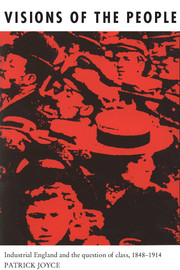Book contents
- Frontmatter
- Contents
- List of plates
- Acknowledgements
- 1 Introduction: beyond class?
- PART I POWER AND THE PEOPLE: POLITICS AND THE SOCIAL ORDER
- PART II MORALISING THE MARKET: WORK AND THE SOCIAL ORDER
- 4 Civilising capital: class and the moral discourses of labour
- 5 Building the union: ‘the gospel of absolute and perfect organisation’
- PART III CUSTOM, HISTORY, LANGUAGE: POPULAR CULTURE AND THE SOCIAL ORDER
- PART IV KINGDOMS OF THE MIND: THE IMAGINARY CONSTITUTION OF THE SOCIAL ORDER
- Appendices
- Bibliographical note
- Notes
- Index
4 - Civilising capital: class and the moral discourses of labour
Published online by Cambridge University Press: 05 March 2012
- Frontmatter
- Contents
- List of plates
- Acknowledgements
- 1 Introduction: beyond class?
- PART I POWER AND THE PEOPLE: POLITICS AND THE SOCIAL ORDER
- PART II MORALISING THE MARKET: WORK AND THE SOCIAL ORDER
- 4 Civilising capital: class and the moral discourses of labour
- 5 Building the union: ‘the gospel of absolute and perfect organisation’
- PART III CUSTOM, HISTORY, LANGUAGE: POPULAR CULTURE AND THE SOCIAL ORDER
- PART IV KINGDOMS OF THE MIND: THE IMAGINARY CONSTITUTION OF THE SOCIAL ORDER
- Appendices
- Bibliographical note
- Notes
- Index
Summary
If class was a somewhat elusive presence in the political sphere then commonsense would tell us that in the world of work it found its true home. Surely, the accelerating pace of proletarianisation in the nineteenth century led to the widespread development of class identities which were rooted in the economic categories of labour and capital and gave rise to conflictual conceptions of society which, unlike in previous times, were anchored firmly in the area of industrial production, rather than economic exchange or distribution? This was so, but only partly so. It represented one among many tendencies of development, and was not as single or overarching as it is so often taken to be. In themselves, the forms of class manifest at the time turn out on closer examination to be somewhat different from what we might expect.
In this section I have chosen to concentrate chiefly on cotton factory workers, the manifestation of the new in the contemporary economy. With these workers we would expect to find most clearly expressed a sense that the social order had resolved itself into the antinomies of labour and capital, and that the customary values of the past had given way to the economic and class values of the capitalist marketplace. We find something of this, and the rise of ‘economic’, ‘market’ categories is a subject broached in this chapter, and pursued in the next.
- Type
- Chapter
- Information
- Visions of the PeopleIndustrial England and the Question of Class, c.1848–1914, pp. 87 - 113Publisher: Cambridge University PressPrint publication year: 1991



